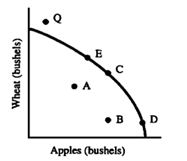Exam 3: The Fundamental Economic Problem: Scarcity and Choice
Exam 1: What Is Economics261 Questions
Exam 2: The Economy: Myth and Reality185 Questions
Exam 3: The Fundamental Economic Problem: Scarcity and Choice290 Questions
Exam 4: Supply and Demand: an Initial Look337 Questions
Exam 5: Consumer Choice: Individual and Market Demand243 Questions
Exam 6: Demand and Elasticity254 Questions
Exam 7: Production, Inputs, and Cost: Building Blocks for Supply Analysis260 Questions
Exam 8: Output, Price, and Profit: the Importance of Marginal Analysis234 Questions
Exam 9: The Financial Markets and the Economy: the Tail That Wags the Dog227 Questions
Exam 10: The Firm and the Industry Under Perfect Competition253 Questions
Exam 11: The Case for Free Markets: the Price System259 Questions
Exam 12: Monopoly244 Questions
Exam 13: Between Competition and Monopoly254 Questions
Exam 14: Limiting Market Power: Antitrust and Regulation155 Questions
Exam 15: The Shortcomings of Free Markets219 Questions
Exam 16: Externalities, Externaliteis, the Environment, and Natural Resources222 Questions
Exam 17: Taxation and Resource Allocation221 Questions
Exam 18: Pricing the Factors of Production233 Questions
Exam 19: Labor and Entrepreneurship: the Human Inputs271 Questions
Exam 20: Poverty, Inequality, and Discrimination171 Questions
Exam 21: International Trade and Comparative Advantage226 Questions
Exam 22: Contemporary Issues in the Us Economy23 Questions
Select questions type
In an economy, unemployment exists only at points that are on the interior of the production possibilities frontier.
(True/False)
4.8/5  (39)
(39)
An economist claims that any point not on a production possibilities frontier cannot be best. What is his reasoning to support this?
(Multiple Choice)
4.9/5  (40)
(40)
If Japan and the United States engage in trade, and Japan gains as a result of the trade, does that mean the United States has lost in some manner?
(Essay)
4.8/5  (24)
(24)
When a firm or economy is operating efficiently, it is operating
(Multiple Choice)
4.7/5  (43)
(43)
According to Baumol, Blinder, and Solow, recognition of the usefulness of markets
(Multiple Choice)
4.9/5  (37)
(37)
Mick Jagger, a former student at the London School of Economics, once sang, "You can't always get what you want, but if you try sometime, you just might find you can get what you need." Another statement of the basic economic principle expressed in this lyric is that
(Multiple Choice)
4.8/5  (38)
(38)
Figure 3-4
 -In Figure 3-4, for which of the following would this statement be true: "To get more apples we have to give up wheat." A movement from
-In Figure 3-4, for which of the following would this statement be true: "To get more apples we have to give up wheat." A movement from
(Multiple Choice)
4.7/5  (30)
(30)
Society can produce at a point outside the production possibilities frontier, but only if it is using all of its resources efficiently.
(True/False)
4.8/5  (40)
(40)
Showing 281 - 290 of 290
Filters
- Essay(0)
- Multiple Choice(0)
- Short Answer(0)
- True False(0)
- Matching(0)